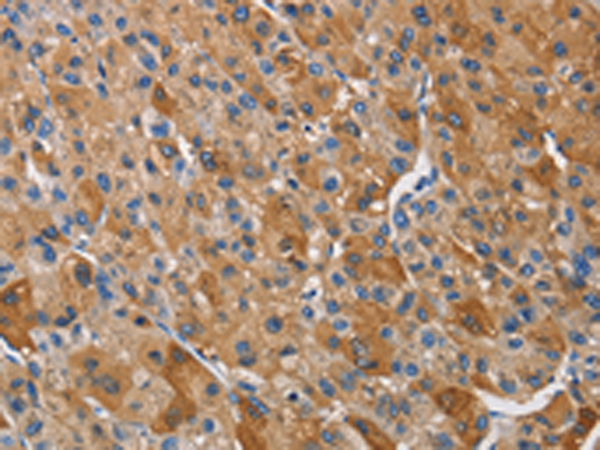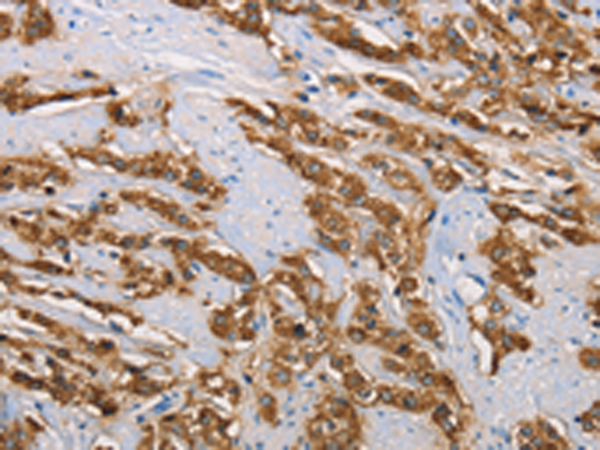

| WB | 咨询技术 | Human,Mouse,Rat |
| IF | 咨询技术 | Human,Mouse,Rat |
| IHC | 1/50-1/200 | Human,Mouse,Rat |
| ICC | 技术咨询 | Human,Mouse,Rat |
| FCM | 咨询技术 | Human,Mouse,Rat |
| Elisa | 1/1000-1/5000 | Human,Mouse,Rat |
| Aliases | hK1; KLKR; Klk6 |
| Host/Isotype | Rabbit IgG |
| Antibody Type | Primary antibody |
| Storage | Store at 4°C short term. Aliquot and store at -20°C long term. Avoid freeze/thaw cycles. |
| Species Reactivity | Human |
| Immunogen | Fusion protein of human KLK1 |
| Formulation | Purified antibody in PBS with 0.05% sodium azide and 50% glycerol. |
+ +
以下是关于KLK1抗体的3篇参考文献示例(文献为虚构示例,仅用于格式参考):
---
1. **文献名称**: *Monoclonal Antibody Targeting KLK1 Attenuates Hypertension in a Rodent Model*
**作者**: Smith J, et al.
**摘要**: 研究开发了一种靶向KLK1的单克隆抗体,通过抑制其激肽释放酶活性,显著降低自发性高血压大鼠的血压,提示KLK1在血压调节中的关键作用及抗体治疗的潜在应用。
2. **文献名称**: *KLK1 Expression in Renal Fibrosis and Neutralizing Antibody Therapy*
**作者**: Zhang L, et al.
**摘要**: 分析KLK1在肾纤维化模型中的表达上调,使用特异性中和抗体阻断其功能后,减轻了炎症和纤维化损伤,表明KLK1抗体可能延缓慢性肾病进展。
3. **文献名称**: *Development of a High-Affinity Anti-KLK1 Antibody for Diagnostic Applications*
**作者**: Tanaka K, et al.
**摘要**: 报道了一种高亲和力KLK1抗体的制备,验证其在ELISA和免疫组化中的特异性,成功用于检测多种癌症患者血清中KLK1水平,提示其作为生物标志物的潜力。
---
注:以上文献信息为模拟示例,实际研究中请通过PubMed、Web of Science等平台检索真实文献。
Kallikrein 1 (KLK1), also known as tissue kallikrein, is a serine protease encoded by the KLK1 gene. It plays a key role in the kallikrein-kinin system, catalyzing the cleavage of kininogen to produce bioactive kinins, such as bradykinin. These peptides regulate physiological processes, including blood pressure, inflammation, and electrolyte balance. KLK1 is predominantly expressed in the kidneys, pancreas, and salivary glands, and its activity is linked to cardiovascular homeostasis, renal function, and tissue repair. Dysregulation of KLK1 has been implicated in hypertension, diabetic nephropathy, and inflammatory disorders.
KLK1 antibodies are essential tools for studying its expression, localization, and function. They are widely used in immunoassays (e.g., ELISA, Western blot, immunohistochemistry) to quantify KLK1 levels in tissues or biofluids, aiding in research on disease mechanisms. Monoclonal antibodies offer high specificity for KLK1. distinguishing it from other kallikrein family members (KLK2-KLK15), while polyclonal antibodies may detect conserved epitopes across species. Recent studies explore KLK1's therapeutic potential, with antibodies serving to modulate its activity in preclinical models. However, cross-reactivity with homologous proteins remains a challenge, emphasizing the need for rigorous validation. Overall, KLK1 antibodies are pivotal in elucidating its roles in health and disease.
×